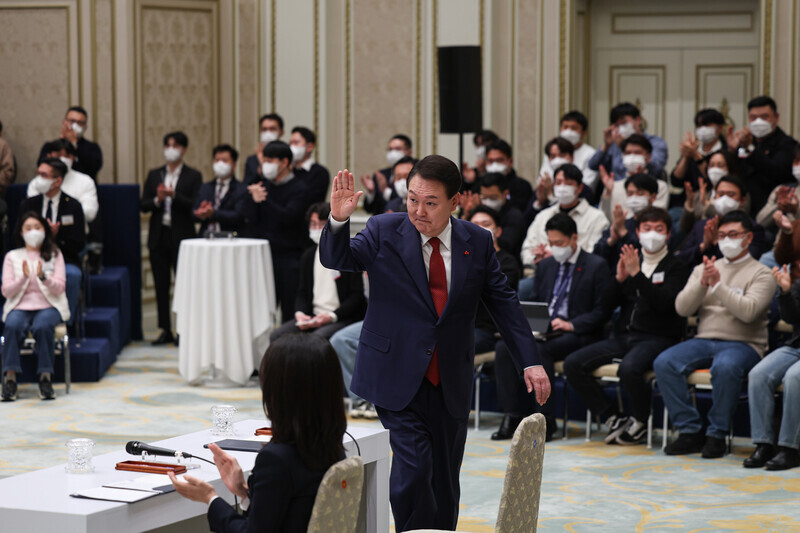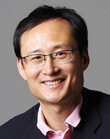hankyoreh
Links to other country sites 다른 나라 사이트 링크
[Column] Paradoxical President Yoon Suk-yeol


On Dec. 13, President Yoon Suk-yeol referred during a Cabinet meeting to the necessity to check whether a system is in place to ensure fair compensation is given to players on the national soccer team. When I read about this in an article, I thought to myself, “Does the president really care about this sort of thing?”
Any remarks made by the president at a Cabinet meeting are strict instructions that government ministries must follow. There is still controversy about whether the Korea Football Association properly distributed money received from FIFA to the soccer players for their participation in the World Cup. Of course, if there is an issue with the distribution of compensation, it should be sorted out.
But is it really appropriate for the president of the country to attend to these kinds of matters in such detail, given existing urgent parliamentary legislation and piled-up pending issues concerning the economy and security?
This reminded me of how former President Chun Doo-hwan’s comments were published on the front pages of all newspapers in 1983 after he said the country’s soccer had to be developed in an “offense-oriented way” in order to survive. Isn’t this precisely what an “imperial president” looks like?
Since the issue of compensation for the national soccer team was already a widely known fact, even if nothing changes, the president’s remarks should be seen as giving us a peek into his wide sphere of interests and his level of leisure.
However, the fact that the ruling party has revived decades’ old methods for choosing a leader simply because the president mentioned it symbolically reveals the serious setbacks that democracy can suffer due to the harmful consequences of power that is not kept in check.
Even though Yoon is not currently serving as the head of his party, as soon as his opinion was made known, the People Power Party (PPP) leadership decided to amend the rules for how the next party leader would be elected. The decision was made that the next PPP leader would be determined entirely through the votes of party members.
The ulterior motive behind this was to prevent former lawmaker Yoo Seong-min, an anti-Yoon PPP member, from taking the helm of the party.
The fact that experienced politicians as well as young, first-time lawmakers are welcoming such political regression raises doubts about whether party democracy has developed in Korea at all. It’s far past due time to ask where such common-sense-defying regression and anachronism are coming from.
Aside from Yoon’s brash nature through which he intimidates his advisers with his overly confident tone, the president’s political position is actually quite weak, if viewed in an objective way.
For example, Yoon narrowly won the presidential election by only 240,000 votes and his approval rating is only now barely crossing the 40% threshold, despite it still being the early stages of his presidency.
Meanwhile, the National Assembly is dominated by the opposition parties and it’s difficult to find any legislative wins or even progress made regarding the ongoing economic crisis.
Families of victims of the Itaewon disaster were able to overcome the government’s interference and come together in solidarity while protests continue every weekend demanding an apology from the president and the resignation of Minister of the Interior and Safety Lee Sang-min.
Despite the highly precarious political situation, it is only the president who appears unflinching, instead trying to exercise his power more extensively and bluntly.
The reason why this is possible is that the president’s exercise of power is being directed toward intensifying division and confrontation between different blocs, not toward integration or the resolution of conflict. It’s an interesting paradox in which the president’s self-righteousness becomes worse as the political crises intensify.
We witnessed a similar bizarre exercise of power by US President Donald Trump a few years ago. In 2016, Trump lost the popular vote and only narrowly won the electoral college vote. Throughout his time in office, his approval rating never exceeded 50%, instead hovering around 40%, which is considered the danger zone.
In addition, Trump’s performance in key policy areas such as the economy and foreign policy was far from competent.
Still, his words and actions always upended media predictions and he rarely gave up on something after having made up his mind about it. For example, despite global condemnation and congressional opposition, he went ahead and erected the border wall with Mexico and also started a major trade war with China.
Those who helped such a charismatic Trump overcome the vulnerability of the political environment were hardcore conservative supporters who came together and helped move the Republican Party in the direction they wanted.
The current Yoon administration and ruling PPP in South Korea are very similar to the Trump era of politics in the US. This is illustrated, for example, through how Yoon likened the recent strike by truckers to the North Korean nuclear threat and through extreme remarks, such as “if we fail to implement labor reform, both politics and the economy will be ruined.”
In an interview he gave right before leaving office, former President Moon Jae-in asked, “Was I an imperial president? Why am I an imperial president?” confessing what had weighed on his mind throughout his five-year term.
There can be many views regarding whether Moon’s presidency was “imperial” or not, but it’s difficult to completely break free from imperial qualities both in South Korea and the US given the modern presidential system, which has expanded its authority to many sectors including the economy and security.
However, despite incessantly pointing to the dangers of an “imperial president,” conservative media and intellectuals do not use this term to describe the Yoon Suk-yeol presidency, despite how the current president uses the ruling party as his own tool or how he sees laborers as enemies.
Is this because Yoon is more than an imperial president — and is the rare "paradoxical president"?
Please direct questions or comments to [english@hani.co.kr]

Editorial・opinion
![[Column] Life on our Trisolaris [Column] Life on our Trisolaris](https://flexible.img.hani.co.kr/flexible/normal/500/300/imgdb/original/2024/0505/4817148682278544.jpg) [Column] Life on our Trisolaris
[Column] Life on our Trisolaris![[Editorial] Penalties for airing allegations against Korea’s first lady endanger free press [Editorial] Penalties for airing allegations against Korea’s first lady endanger free press](https://flexible.img.hani.co.kr/flexible/normal/500/300/imgdb/original/2024/0502/1817146398095106.jpg) [Editorial] Penalties for airing allegations against Korea’s first lady endanger free press
[Editorial] Penalties for airing allegations against Korea’s first lady endanger free press- [Editorial] Yoon must halt procurement of SM-3 interceptor missiles
- [Guest essay] Maybe Korea’s rapid population decline is an opportunity, not a crisis
- [Column] Can Yoon steer diplomacy with Russia, China back on track?
- [Column] Season 2 of special prosecutor probe may be coming to Korea soon
- [Column] Park Geun-hye déjà vu in Yoon Suk-yeol
- [Editorial] New weight of N. Korea’s nuclear threats makes dialogue all the more urgent
- [Guest essay] The real reason Korea’s new right wants to dub Rhee a founding father
- [Column] ‘Choson’: Is it time we start referring to N. Korea in its own terms?
Most viewed articles
- 1New sex-ed guidelines forbid teaching about homosexuality
- 2OECD upgrades Korea’s growth forecast from 2.2% to 2.6%
- 3[Column] Life on our Trisolaris
- 4Months and months of overdue wages are pushing migrant workers in Korea into debt
- 560% of young Koreans see no need to have kids after marriage
- 6Presidential office warns of veto in response to opposition passing special counsel probe act
- 7Korean government’s compromise plan for medical reform swiftly rejected by doctors
- 8[Guest essay] Maybe Korea’s rapid population decline is an opportunity, not a crisis
- 9Is Japan about to snatch control of Line messenger from Korea’s Naver?
- 10Inside the law for a special counsel probe over a Korean Marine’s death